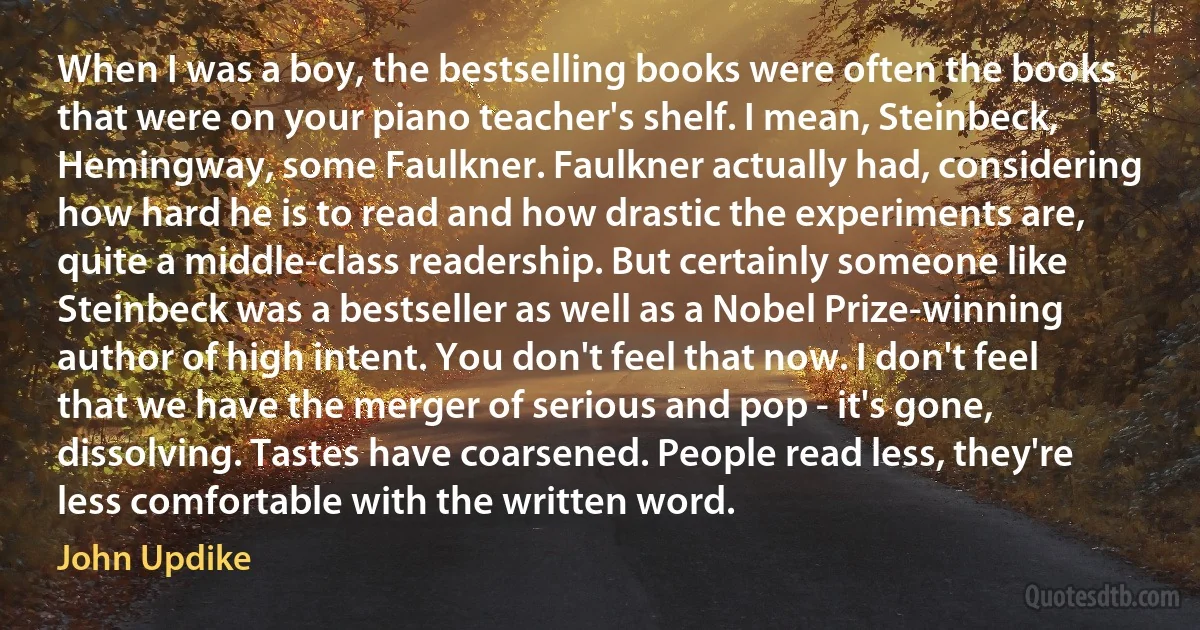
When I was a boy, the bestselling books were often the books that were on your piano teacher's shelf. I mean, Steinbeck, Hemingway, some Faulkner. Faulkner actually had, considering how hard he is to read and how drastic the experiments are, quite a middle-class readership. But certainly someone like Steinbeck was a bestseller as well as a Nobel Prize-winning author of high intent. You don't feel that now. I don't feel that we have the merger of serious and pop - it's gone, dissolving. Tastes have coarsened. People read less, they're less comfortable with the written word.
John UpdikeRelated topics
boy considering dissolving drastic hard high less mean merger now people piano quite read readership well word write someone nobel bestseller faulkner hemingwayRelated quotes
It is often said that all the conditions for the first production of a living organism are now present, which could ever have been present. But if (and oh! what a big if!) we could conceive in some warm little pond, with all sorts of ammonia and phosphoric salts, light, heat, electricity, &c., present, that a proteine compound was chemically formed ready to undergo stillmore complex changes, at the present day such matter would be instantly devoured or absorbed, which would not have been the case before living creatures were formed.

Charles Darwin
Let's begin with capitalism, a word that has gone largely out of fashion. The approved reference now is to the market system. This shift minimizes - indeed, deletes - the role of wealth in the economic and social system. And it sheds the adverse connotation going back to Marx. Instead of the owners of capital or their attendants in control, we have the admirably impersonal role of market forces. It would be hard to think of a change in terminology more in the interest of those to whom money accords power. They have now a functional anonymity.

John Kenneth Galbraith
Today there really aren't that many Fundamentalists left; I don't know if you know that or not, but they are such a minority; there aren't that many Fundamentalists left in America. ... Now the word "fundamentalist" actually comes from a document in the 1920s called the Five Fundamentals of the Faith. And it is a very legalistic, narrow view of Christianity, and when I say there are very few fundamentalists, I mean in the sense that they are all actually called fundamentalist churches, and those would be quite small. There are no large ones.

Rick Warren
Some students of philosophy have unreasonably high expectations of the subject. They expect it to provide them with a complete and detailed picture of the human predicament. They think that philosophy will reveal to them the meaning of life, and explain to them every facet of our complex existences. Now, although studying philosophy can illuminate fundamental questions about our lives, it does not provide anything like a complete picture, if indeed there could be such a thing. Studying philosophy isn't an alternative to studying art, literature, history, psychology, anthropology, sociology, politics, and science.

Nigel Warburton
Broader and deeper we must write our annals, from an ethical reformation, from an influx of the ever new, ever sanative conscience, if we would trulier express our central and wide-related nature, instead of this old chronology of selfishness and pride to which we have too long lent our eyes. Already that day exists for us, shines in on us at unawares, but the path of science and of letters is not the way into nature. The idiot, the Indian, the child, and unschooled farmer's boy, stand nearer to the light by which nature is to be read, than the dissector or the antiquary.

Ralph Waldo Emerson
